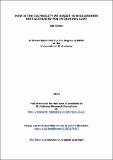Files in this item
How is the culpability we assign to recklessness best accounted for in criminal law?
Item metadata
| dc.contributor.advisor | Baron, Marcia | |
| dc.contributor.advisor | McElwee, Brian | |
| dc.contributor.author | Slater, Joe | |
| dc.coverage.spatial | 116 p. | en_US |
| dc.date.accessioned | 2016-09-08T11:33:33Z | |
| dc.date.available | 2016-09-08T11:33:33Z | |
| dc.date.issued | 2014 | |
| dc.identifier.uri | https://hdl.handle.net/10023/9457 | |
| dc.description.abstract | In order to be properly applied, criminal law must determine what conduct warrants punitive action. Figuring out exactly how one must act to be criminally liable is a difficulty that faces any legal system. In many jurisdictions criminal recklessness is regarded as an important notion for liability. However, recklessness is difficult to define, and attempts at this exercise have been a problem in legal philosophy since the mid-twentieth century, and persist today (Crosby 2008). This thesis discusses accounts of recklessness with the aim of defining it in a way that overcomes several problems which have arisen in recent legal history. It is widely accepted, as well as prima facie intuitive, that people can be culpable for acts committed recklessly. Despite this, whether or not a state of mind is reckless is difficult to define, let alone define in a way that is not only conceptually sound, but also pragmatically apt. Recklessness occurs when an agent engages in some risky activity, but factors like the agent’s attitude and whether the risk is foreseen have been cited as relevant when ascertaining their recklessness. I discuss some difficulties in legally framing recklessness, before criticising some definitional manoeuvres made by judges and scholars in the past. With some problems in previous accounts noted, I consider the foundations of culpability in general. I suggest that two accounts of culpability – the agency theory and the choice theory – are both plausible, and each correlates to a prominent contemporary position on recklessness (and criminal law in general). After serious consideration of both positions, I conclude that the position advocated by Antony Duff, which I see as in keeping with the agency theory of culpability, is both more generally useful for criminal law and much more coherent with our everyday practices of blaming and punishing. | en_US |
| dc.language.iso | en | en_US |
| dc.publisher | University of St Andrews | |
| dc.subject.lcc | K5065.S6 | |
| dc.subject.lcsh | Criminal liability--Philosophy | en_US |
| dc.title | How is the culpability we assign to recklessness best accounted for in criminal law? | en_US |
| dc.type | Thesis | en_US |
| dc.type.qualificationlevel | Doctoral | en_US |
| dc.type.qualificationname | MPhil Master of Philosophy | en_US |
| dc.publisher.institution | The University of St Andrews | en_US |
This item appears in the following Collection(s)
Items in the St Andrews Research Repository are protected by copyright, with all rights reserved, unless otherwise indicated.

